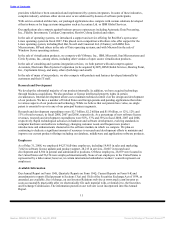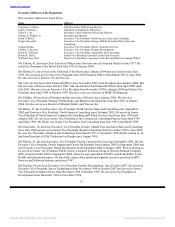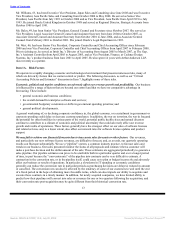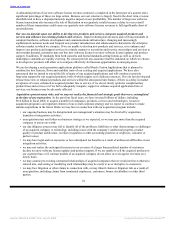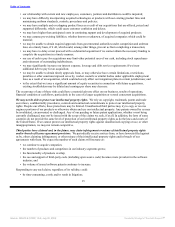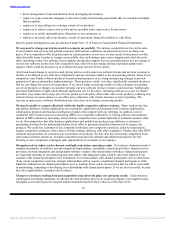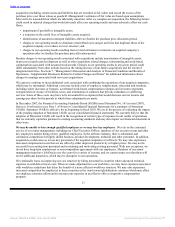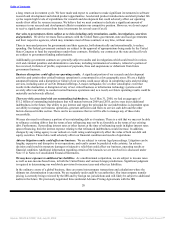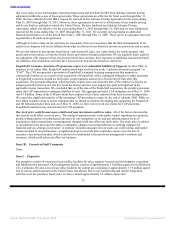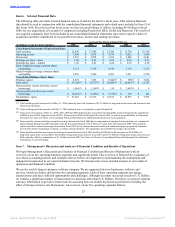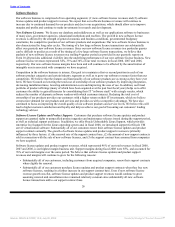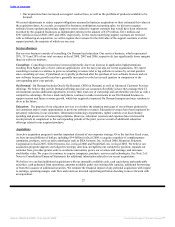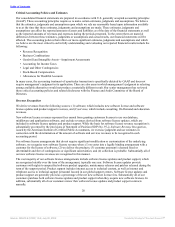Oracle 2007 Annual Report Download - page 25
Download and view the complete annual report
Please find page 25 of the 2007 Oracle annual report below. You can navigate through the pages in the report by either clicking on the pages listed below, or by using the keyword search tool below to find specific information within the annual report.
Table of Contents
a long return on investment cycle. We have made and expect to continue to make significant investments in software
research and development and related product opportunities. Accelerated product introductions and short product life
cycles require high levels of expenditures for research and development that could adversely affect our operating
results if not offset by revenue increases. We believe that we must continue to dedicate a significant amount of
resources to our research and development efforts to maintain our competitive position. However, we do not expect
to receive significant revenues from these investments for several years if at all.
Our sales to government clients subject us to risks including early termination, audits, investigations, sanctions
and penalties. We derive revenues from contracts with the United States government, state and local governments
and their respective agencies, which may terminate most of these contracts at any time, without cause.
There is increased pressure for governments and their agencies, both domestically and internationally, to reduce
spending. Our federal government contracts are subject to the approval of appropriations being made by the United
States Congress to fund the expenditures under these contracts. Similarly, our contracts at the state and local levels
are subject to government funding authorizations.
Additionally, government contracts are generally subject to audits and investigations which could result in various
civil and criminal penalties and administrative sanctions, including termination of contracts, refund of a portion of
fees received, forfeiture of profits, suspension of payments, fines and suspensions or debarment from future
government business.
Business disruptions could affect our operating results. A significant portion of our research and development
activities and certain other critical business operations is concentrated in a few geographic areas. We are a highly
automated business and a disruption or failure of our systems could cause delays in completing sales and providing
services, including some of our On Demand offerings. A major earthquake, fire or other catastrophic event that
results in the destruction or disruption of any of our critical business or information technology systems could
severely affect our ability to conduct normal business operations and, as a result, our future operating results could be
materially and adversely affected.
There are risks associated with our outstanding indebtedness. As of May 31, 2008, we had an aggregate of
$11.2 billion of outstanding indebtedness that will mature between 2009 and 2038, and we may incur additional
indebtedness in the future. Our ability to pay interest and repay the principal for our indebtedness is dependent upon
our ability to manage our business operations, generate sufficient cash flows to service such debt and the other
factors discussed in this section. There can be no assurance that we will be able to manage any of these risks
successfully.
We may also need to refinance a portion of our outstanding debt as it matures. There is a risk that we may not be able
to refinance existing debt or that the terms of any refinancing may not be as favorable as the terms of our existing
debt. Furthermore, if prevailing interest rates or other factors at the time of refinancing result in higher interest rates
upon refinancing, then the interest expense relating to that refinanced indebtedness would increase. In addition,
changes by any rating agency to our outlook or credit rating could negatively affect the value of both our debt and
equity securities. These risks could adversely affect our financial condition and results of operations.
Adverse litigation results could affect our business. We are subject to various legal proceedings. Litigation can be
lengthy, expensive and disruptive to our operations, and results cannot be predicted with certainty. An adverse
decision could result in monetary damages or injunctive relief that could affect our business, operating results or
financial condition. Additional information regarding certain of the lawsuits we are involved in is discussed under
Note 15 in Notes to Consolidated Financial Statements.
We may have exposure to additional tax liabilities. As a multinational corporation, we are subject to income taxes
as well as non-income based taxes, in both the United States and various foreign jurisdictions. Significant judgment
is required in determining our worldwide provision for income taxes and other tax liabilities.
In the ordinary course of a global business, there are many intercompany transactions and calculations where the
ultimate tax determination is uncertain. We are regularly under audit by tax authorities. Our intercompany transfer
pricing is currently being reviewed by the IRS and by foreign tax jurisdictions and will likely be subject to additional
audits in the future. We previously negotiated three unilateral Advance Pricing Agreements with the IRS
20
Source: ORACLE CORP, 10-K, July 02, 2008 Powered by Morningstar® Document Research℠



